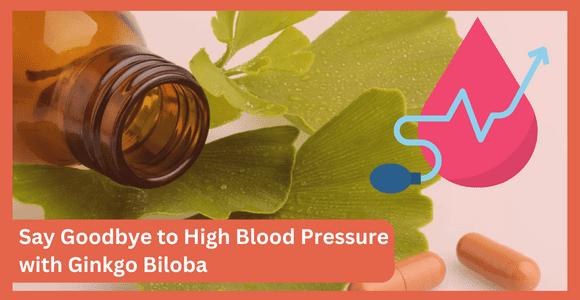With an extensive background in healing blood disorders and cognitive difficulties, Ginkgo (Ginkgo biloba) is a species of tree that has long been sought-after for its health benefits. It’s no surprise then why it is one of the most successful herbal supplements sold in both America and Europe!
Not only does laboratory research suggest gingko can enhance circulation by widening vessels and making our blood less viscous, but this ancient herb also acts as a powerful antioxidant – helping to protect your body from cell damage. Most notably, however, devout users have reported that consuming Ginko on a regular basis may help maintain healthy memory functioning.
Table of Contents
What Does Ginkgo Biloba Actually Do?
Due to its potential benefits, using ginkgo may help improve vein and eye health. Although not all studies are in agreement, it may also be beneficial for treating dementia (including Alzheimer’s) and intermittent claudication or lack of circulation in the legs. Further, Ginkgo has been found to protect memory function among older people, and it is cardioprotective.
Ginkgo leaves contain a wealth of antioxidants such as flavonoids and terpenoids, which guard against the damaging effects of free radicals.
As you age, these harmful molecules accumulate in your body and may lead to serious health issues like heart disease, cancer, or Alzheimer’s. Luckily, ginkgo leaf extracts can help fight off these free radicals that damage DNA and other cells so you can live healthier for longer.
Available Forms:
- Standardized extracts containing 24 to 32% flavonoids (also known as flavone glycosides or heterosides) and 6 to 12% terpenoids (triterpene lactones)
- Capsules
- Tablets
- Liquid extracts (tinctures, fluid extracts, and glycerites)
- Dried leaf for teas
Side Effects. What Are the Dangers of Ginkgo Biloba?
If you’re considering taking Ginkgo Biloba, it’s important to be aware of the potential risks and side effects associated with its use.
Here are some key points to keep in mind:
 It is generally considered safe, but it can increase the risk of bleeding due to its blood-thinning properties. Be cautious if you’re taking any medications that also act as blood thinners.
It is generally considered safe, but it can increase the risk of bleeding due to its blood-thinning properties. Be cautious if you’re taking any medications that also act as blood thinners.- Some people may experience allergic reactions or digestive issues like nausea and diarrhea when taking Ginkgo Biloba. If you notice any adverse effects, stop taking the supplement and speak with your healthcare provider.
- People with a history of epilepsy or seizures should be particularly cautious when taking Ginkgo Biloba, as it can potentially trigger seizures.
- Ginkgo Biloba can interact with certain medications, including antidepressants, blood thinners, and anti-seizure medication. Always talk to your doctor before taking this supplement if you’re on any medications.
- Quality and purity can vary greatly among supplements. To ensure you’re getting a safe and effective product, speak with your healthcare provider for recommendations on reputable brands and sources.
Remember, it’s always better to be safe than sorry when it comes to your health. If you’re considering taking Ginkgo Biloba or any other supplements, consult with your doctor first to make sure they’re right for you.
Does Ginkgo Cause High Blood Pressure?
After inspecting the effects of ginkgo biloba on elderly men and women from the GEM study, it was concluded that this herb has no effect on blood pressure or pulse rate.
Surprisingly, we found equal decreases in systolic and diastolic BP and PP between those taking ginkgo biloba supplementations compared to a placebo. It appears that for those within our sample population, these treatments had little impact regardless of the dosage level taken.
Frequently Asked Questions
Who Should Not Take Ginkgo Biloba?
If you are elderly, suffer from a bleeding disorder, or are expecting a baby, avoid taking ginkgo supplements as it may increase your risk for hemorrhages.
Additionally, if you’re scheduled to have surgery in the near future make sure to suspend consumption of ginkgo at least two weeks prior. It is also important to note that those with diabetes should be particularly cautious when taking this supplement as glycemic control could potentially be affected by its use.
Is Ginkgo Biloba Good for Your Heart?
Yes, it improves circulation and heart health
Does Ginkgo Biloba Increase Blood Flow to the Brain?
Yes, Ginkgo Biloba is believed to increase blood flow to the brain. It contains compounds that have been shown to dilate blood vessels and improve circulation, which can in turn increase the amount of oxygen and nutrients delivered to the brain.
Conclusion
If you suffer from hypertension, you may be considering if it is wise to take Ginkgo Biloba. While this dietary supplement has been revealed to possess several possible health advantages, there are some indications that suggest it could possibly raise blood pressure in particular individuals. Therefore, before taking any medication or supplements for your condition consult with your doctor first.
 Research has discovered that supplementing with Ginkgo Biloba may lead to an elevation of blood pressure for those who are already hypertensive. This could be due to the fact that it acts as a vasodilator, which means that it can open up and relax constricted vessels, thus allowing more blood to flow through them.
Research has discovered that supplementing with Ginkgo Biloba may lead to an elevation of blood pressure for those who are already hypertensive. This could be due to the fact that it acts as a vasodilator, which means that it can open up and relax constricted vessels, thus allowing more blood to flow through them.
In certain cases, this results in a rise in readings from the sphygmomanometer – indicating higher levels than before taking.
Although the outcomes of Ginkgo Biloba’s influence on blood pressure are inconclusive, more research is required to understand how this supplement influences hypertension.
It ought to be kept in mind that each person has a distinct body and what works for one might not necessarily work for another.
If you suffer from high blood pressure and considering taking it, it’s highly advised you consult with your healthcare provider first before doing so. They can assist you in evaluating if this supplement will be safe to take while also providing advice regarding an appropriate dosage before commencing usage.

 It is generally considered safe, but it can increase the risk of bleeding due to its blood-thinning properties. Be cautious if you’re taking any medications that also act as blood thinners.
It is generally considered safe, but it can increase the risk of bleeding due to its blood-thinning properties. Be cautious if you’re taking any medications that also act as blood thinners.